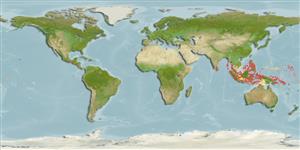Common names from other countries
>
Kurtiformes (Nurseryfishes, cardinalfishes.) >
Apogonidae (Cardinalfishes) > Pseudamiinae
Etymology: Pseudamia: Greek, pseudes = false + Greek, amia = a kind of shark (Ref. 45335).
More on author: Bleeker.
Environment: milieu / climate zone / depth range / distribution range
Ökologie
seewasser; brackwasser riff-verbunden; tiefenbereich 0 - 30 m (Ref. 11890), usually 2 - 3 m (Ref. 90102). Tropical; 19°N - 12°S
Indo-West Pacific: Singapore, Java, Borneo, Philippines, Moluccas, New Guinea, Solomon Islands, Palau, and Yap in the western Caroline Islands. Recently reported from Tonga (Ref. 53797).
Size / Gewicht / Alter
Maturity: Lm ? range ? - ? cm
Max length : 8.5 cm SL Männchen/unbestimmt; (Ref. 48635)
Rückenflossenstacheln (insgesamt): 7; Rückenflossenweichstrahlen (insgesamt): 8; Afterflossenstacheln 2; Afterflossenweichstrahlen: 9 - 10; Wirbelzahl: 24. When fresh, body translucent gray, thorax and abdomen light golden; variable sized brown spots on head; golden operculum with close-set blackish spots forming broad dark stripes. Caudal fin base with a large, round, dark brown spot. Anterior nostril with long, darkly pigmented membranous flap. Posterior half of upper jaw almost white, usually with a small dark spot on the side of maxilla. Second dorsal spine longest. 39-41 scales in longitudinal series. Convex interorbital space.
Inhabits shallow mangrove creeks and nearby shallow lagoon reefs and seagrass beds; also taken from isolated pools. Generally found in depths less than 2 m and where water condition is turbid.
Life cycle and mating behavior
Geschlechtsreife | Fortpflanzung | Ablaichen | Eier | Fecundity | Larven
Distinct pairing during courtship and spawning (Ref. 205).
Randall, J.E., E.A. Lachner and T.H. Fraser, 1985. Revision of the Indo-Pacific apogonid fish genus Pseudamia, with descriptions of three new species. Indo-Pac. Fish. 6:1-23. (Ref. 526)
IUCN Rote Liste Status (Ref. 130435)
CITES (Ref. 128078)
Not Evaluated
Bedrohung für Menschen
Harmless
Nutzung durch Menschen
Mehr Information
ReferenzenAquakulturAquakultur ProfilZuchtlinienGenetikElectrophoresesVererbbarkeitKrankheitenVerarbeitungMass conversion
PartnerBilderStamps, Coins Misc.LauteCiguateraGeschwindigkeitSchwimmstilKiemenoberflächeOtolithsGehirngrößeSehfähigkeit
Tools
Zusatzinformationen
Download XML
Internet Quellen
Estimates based on models
Preferred temperature (Ref.
115969): 28.3 - 29.3, mean 28.9 (based on 1708 cells).
Phylogenetic diversity index (Ref.
82804): PD
50 = 0.5078 [Uniqueness, from 0.5 = low to 2.0 = high].
Bayesian length-weight: a=0.00389 (0.00180 - 0.00842), b=3.12 (2.94 - 3.30), in cm Total Length, based on all LWR estimates for this body shape (Ref.
93245).
Trophic level (Ref.
69278): 3.5 ±0.50 se; based on food items.
Widerstandsfähigkeit (Ref.
120179): hoch, Verdopplung der Population dauert weniger als 15 Monate. (Preliminary K or Fecundity.).
Fishing Vulnerability (Ref.
59153): Low vulnerability (10 of 100).
